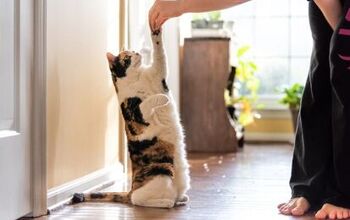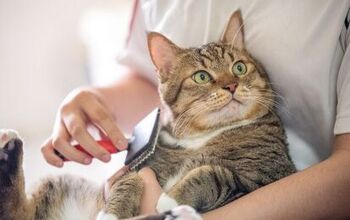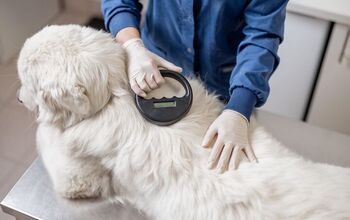Is Your Pooch A Pessimist? Scientists Say The Answer May Be ‘Yes’

Most of us think of dogs the way we often see them — tail vigorously wagging, tongue hanging out and a big ol’ smile plastered on their silly face.
But is it possible that underneath the happy-go-lucky exterior, some of our canine companions might be pessimists? New research out of the University of Sydney says “yes”.
The study, headed up by Dr. Melissa Starling of the university’s Faculty of Veterinary Medicine, could have important implications in how dogs are trained and assessed, particularly in the cases of working or service animals.
So, how exactly were scientists able to determine the optimistic pooches from the pessimistic ones?
They tested a group of 40 dogs using two different sounds, which were two octaves apart. When one sound played, the dogs got milk. When the other played, they received water. Eventually, the dogs learned to associate one sound with a milk treat, and the other with plain old water.
After that, researchers played “ambiguous” tones for the dogs. The dogs that responded to the ambiguous tones were deemed optimistic and the ones that didn’t, pessimistic.
There were even varying degrees of optimism among the already cheerful pups: some dogs responded favorably to ambiguous sounds that were very close to the tone played before being given water.
According to researchers, optimistic dogs are more likely to expect more good things to happen to them and less bad things. These pooches are more likely to take risks in the hope of a reward and more easily bounce back when things don’t go their way.
On the other hand, pessimistic dogs expect more bad things than good things will befall them. They may be more cautious and risk averse, and more likely to give up when faced with setbacks.
Scientists are quick to point out that having a pessimistic bent doesn’t mean your pooch is unhappy or depressed; just that they’re generally content with the status quo and might need a little extra nudge to try new things.
This kind of study is important; as we said above, it could help in the training and selection of service dogs. For example, a more pessimistic dog might make a better guide dog, while an optimistic pooch would be a better drug- or bomb-sniffing dog. Being able to figure out the best fit for a pooch’s personality will mean a happier dog, no matter where the fall on the optimism-pessimism continuum, and that’s always a great thing.
The testing could be used in caring for the average canine, too. If you’re worried that your dog is truly feeling depressed, knowing where they usually stand in terms of optimism and pessimism can give you a good comparison baseline; you’ll be able to judge whether their emotional state is more positive or negative than usual.
If you know your dog is feeling down in the dumps, you can do things you know they love, while avoiding activities that might make them anxious.
And a happy pooch makes for a happy pet parent, right?
[Source: University of Sydney]

Christina Peden is a lifelong animal lover and avid wordsmith. She lives in Toronto with her boyfriend Ryan where they are proud pet parents to puppy, Matilda and cat, Oscar. In her spare time, she can be found enjoying Toronto, Canada's all-too-short patio season, taking advantage of the city's numerous parks or curled up with a good book.
More by Christina Peden























